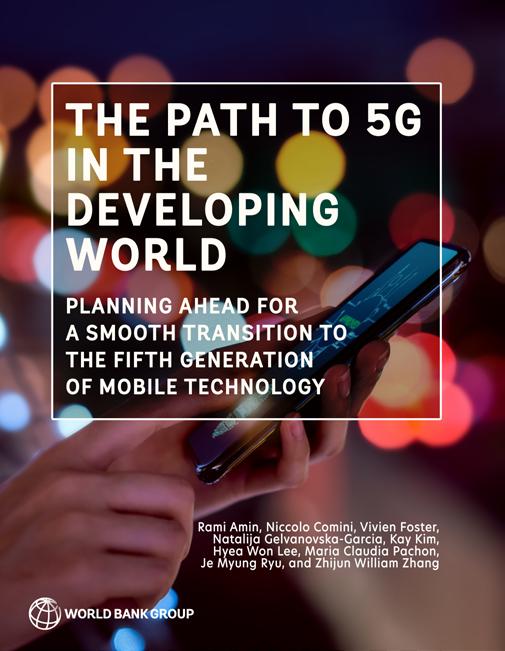
1 minute read
THE PATH TO 5G IN THE DEVELOPING WORLD Planning Ahead for a Smooth Transition
to the Fifth Generation of Mobile Technology
By Rami Amin, Niccolo Comini, Vivien Foster, Natalija Gelvanovska-Garcia, Kay Kim, Hyea Won Lee, Maria Claudia Pachon, Je Myung Ryu, and Zhijun William Zhang
The global race for 5G has seen countries riding a new wave of wireless technology. 5G is the next-generation mobile communication technology, with the capacity to enable a significantly higher level of performance over 4G mobile communications. With the estimated impact of 5G on global GDP in the trillions of US dollars, 5G will drive innovation, job creation, productivity, and competitiveness across a range of sectors.
For some countries, 5G services may seem a distant future prospect; for others, it is an onramp to the Fourth Industrial Revolution and has been folded into national strategy planning. 5G trials, pilots, and commercial deployments have been progressing across the world, but most deployments are in higher-income countries. Significant barriers remain for developing countries that threaten to further widen the digital divide and limit access to the economic opportunities that 5G connectivity enables.
What does this mean for developing countries, and how can governments prepare? This report explores how countries can reach connectivity goals by using 5G as a layer of connectivity alongside 4G and other modalities of connectivity. It also provides a guide for policy makers on the opportunities, challenges, and risks posed by 5G so they can plan for an enabling policy and regulatory ecosystem that support the path to advanced mobile network deployment, access, and adoption.
September 2023. 200 pages. Stock no. C211604 (ISBN: 978-1-4648-1604-8). US$48.50
PRIMER ON LARGE-SCALE ASSESSMENTS OF EDUCATIONAL ACHIEVEMENT (FRENCH EDITION)
By Marguerite Clarke and Diego Luna-Bazaldua
To improve their education systems, countries around the world have increasingly initiated national assessment programs or participated in international or regional largescale assessment studies for the first time. Well-constructed large-scale assessments can provide credible information on student achievement levels, which, in turn, can promote better resource allocation to schools, stronger education service delivery, and improved learning outcomes.
Primer on Large-Scale Assessments of Educational Achievement is a first-stop resource for those wanting to understand how to design, administer, analyze, and use the results from these assessments of student achievement. The book addresses frequently asked questions from people working on large-scale assessment projects and those interested in making informed decisions about them. Each chapter introduces a stage in the assessment process and offers advice, guidelines, and country examples. This book also reports on emerging trends in large-scale assessment and provides updated information on international and regional large-scale assessment programs.
June 2023. 172 pages.
Stock no. C211978
(ISBN: 978-1-4648-1978-0). US$43.95










